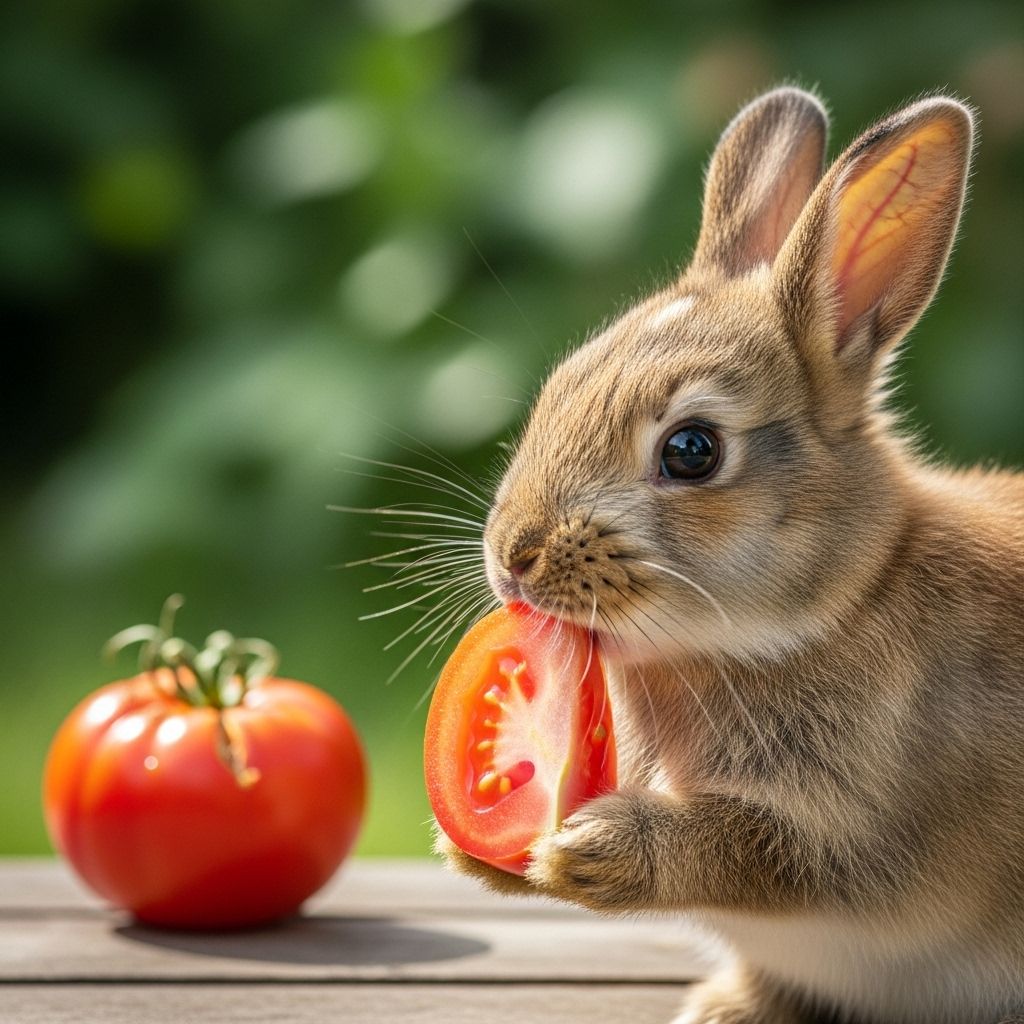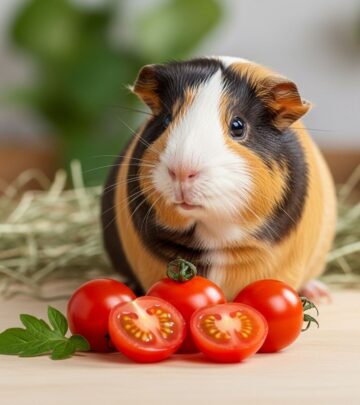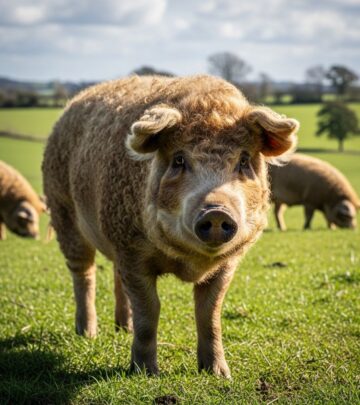Can Rabbits Eat Tomatoes? A Complete Guide To Safe Feeding
Everything you need to know before offering tomatoes to your bunnies—from nutrition to safety and best practices.

Image: HearthJunction Design Team
Can Rabbits Eat Tomatoes?
Tomatoes are a common fruit found in households worldwide. If you share your life with a pet rabbit, you may have wondered: can rabbits safely eat tomatoes? The short answer is yes, rabbits can eat tomatoes, but only under certain conditions and with important precautions. This guide explores the benefits, risks, safe serving methods, and answers common questions about feeding tomatoes to your bunny.
Are Tomatoes Safe for Rabbits?
Tomatoes can be enjoyed by rabbits as an occasional treat, but safety comes first. The key is that rabbits should only eat the ripe flesh of the tomato. All other parts of the tomato plant, including leaves, stems, vines, and unripe (green) tomatoes, contain toxic substances and must be avoided entirely.
- Only ripe, red tomato flesh is safe.
- Leaves, stems, vines, and unripe tomatoes are poisonous due to the presence of alkaloids like solanine and tomatine.
As a general rule, tomatoes should not make up a substantial part of your rabbit’s diet. Instead, they should be given sparingly as a supplement to a balanced meal of hay, leafy greens, and rabbit pellets.
Benefits of Tomatoes for Rabbits
When offered in moderation, ripe tomatoes can provide some health benefits for your bunny:
- Hydration: Tomatoes have a high water content, helping keep your rabbit hydrated, especially in warmer weather.
- Rich in Vitamins: Tomatoes are a source of vitamin C (important for general immune function), vitamin K, and several B vitamins.
- Potassium: This mineral supports proper muscle and nerve function.
- Dietary Fiber: The flesh of the tomato contains fiber, helpful for healthy digestion.
Additionally, offering a variety of safe fruits and vegetables helps create a more nutritionally diverse and stimulating diet for your rabbit, contributing to overall health and well-being.
Risks and Precautions: When Tomatoes Can Be Dangerous
Despite their tasty appeal, tomatoes come with several potential hazards for rabbits if not offered correctly.
Toxic Parts of the Plant
- Leaves, stems, and unripe fruits: These parts contain tomatine and solanine, alkaloids toxic to rabbits. Consuming them can result in digestive upset, lethargy, tremors, or worse in severe cases.
- Seeds: While not as dangerous as the green parts, it’s best to remove seeds before serving, as they can cause digestive irritation in some bunnies.
Acidity and Sugar Content
- Tomatoes are acidic: Too much can cause gastrointestinal distress, including bloating, watery stools, or general discomfort.
- High in sugar: Relative to a rabbit’s regular diet, tomatoes are sugary. Overconsumption can lead to obesity, weight gain, and imbalances in gut flora.
Potential Allergic Reactions
- While rare, some rabbits may develop allergies or sensitivities. Watch for symptoms like itching, swelling, diarrhea, or labored breathing after introducing tomatoes. If you notice any of these, discontinue feeding immediately and consult your veterinarian.
Safe Serving Guidelines: How to Feed Tomatoes to Your Rabbit
To safely share tomatoes with your bunny, follow these best practices:
- Choose only ripe, red tomatoes: Never offer green or unripe tomatoes. Cherry, grape, or standard varieties are all fine if ripe.
- Thoroughly wash the tomato: This removes any lingering pesticides or chemicals that could harm your rabbit.
- Remove all green parts: Cut away stems, leaves, and any green areas on the fruit itself.
- Remove seeds as a precaution: While not as toxic as other plant parts, seeds might cause minor digestive issues. Simply scoop them out before serving.
- Cut into small portions: A rabbit-sized serving is about one small slice or cherry tomato, offered only once or twice a week at most.
- Monitor your bunny: Watch for any signs of digestive upset or allergic reaction after introducing tomatoes for the first time.
Recommended Serving Size
Tomatoes are a treat, not a staple. A good rule of thumb is:
- 1 small wedge or 1 cherry tomato per serving (approximately 1 tablespoon of chopped tomato)
- No more than twice per week
- Always offer alongside a diet rich in hay, with limited pellets and a variety of leafy greens
Which Parts of the Tomato Plant Are Safe for Rabbits?
Here’s a quick breakdown for reference:
| Tomato Part | Safe for Rabbits? | Notes |
|---|---|---|
| Ripe Red Flesh | Yes | Feed in moderation only |
| Seeds | Not recommended | Remove before feeding |
| Leaves/Vines/Stems | No | Toxic—must be avoided entirely |
| Unripe (Green) Tomato | No | Toxic—contains higher levels of alkaloids |
Tips for Adding Tomatoes to Your Rabbit’s Diet
- Introduce tomatoes slowly and in small amounts, especially if your bunny has never had them before.
- Always prioritize hay and leafy greens as the basis of your rabbit’s daily intake.
- Rotate fruit treats. Offer tomatoes occasionally, alongside other safe options, to maximize nutrition and interest.
- If your rabbit refuses tomatoes, don’t worry! Preferences vary and many rabbits get everything they need from standard fare.
Signs of Tomato Toxicity in Rabbits
In the rare event your rabbit ingests a toxic part of the tomato plant, watch for these signs:
- Loss of appetite
- Diarrhea or vomiting
- Lethargy or unusual weakness
- Bloating, abdominal discomfort
- Tremors, shaking, or seizures (in severe cases)
If you notice any of these symptoms, contact your veterinarian immediately.
Common Mistakes When Feeding Tomatoes to Rabbits
- Feeding entire slices with seeds, stems, or leaves attached
- Offering tomatoes too frequently or in large quantities
- Using unrinsed, non-organic tomatoes that may have pesticide residues
- Relying on tomatoes as more than just an occasional treat
Alternative Healthy Treats for Rabbits
If you’re looking to add variety to your rabbit’s treat rotation, consider these options:
- Cucumber
- Bell pepper (no seeds)
- Small pieces of apple (no seeds or core)
- Fresh herbs like parsley, cilantro, or basil
- Leafy greens: romaine, arugula, carrot tops
Remember: all fruits, including tomatoes, should make up less than 5% of your rabbit’s total diet.
Frequently Asked Questions (FAQs)
Q: Can baby rabbits eat tomatoes?
A: It’s best to avoid giving tomatoes to baby rabbits (kits) under 12 weeks old. Their digestive systems are sensitive, and introducing fruits too early can cause problems. Wait until your rabbit is an adult before offering tomatoes.
Q: Can rabbits eat cherry tomatoes?
A: Yes, cherry tomatoes are safe for rabbits if ripe and seedless, and offered in the same limited quantities as standard tomatoes. Always remove stems and any green parts first.
Q: What should I do if my rabbit accidentally eats tomato leaves or stems?
A: Monitor your rabbit for signs of toxicity such as drooling, lethargy, diarrhea, or tremors. If any symptoms occur or if a large amount was consumed, seek veterinary help immediately.
Q: How often can I feed my rabbit tomatoes?
A: Limit tomatoes to once or twice per week as a special treat, never daily.
Q: Can rabbits eat cooked or dried tomatoes?
A: No, only raw, fresh tomato flesh should be offered. Avoid all cooked, sun-dried, canned, pickled, or processed tomato products, as these have additives, higher sugar, and no nutritional benefit for bunnies.
Conclusion: Tomatoes as a Treat for Rabbits
Tomatoes can be a safe, hydrating, and nutritious treat for adult rabbits—as long as you strictly avoid the green parts of the plant, remove seeds, and feed in small amounts on occasion. Remember, moderation and variety are key to a healthy rabbit diet. If you’re ever unsure or if your rabbit has a unique health condition, consult your veterinarian before adding new foods. By following these guidelines, you can share the occasional tomato treat with your bunny while keeping them safe and happy!
References
- https://www.chewy.com/education/small-pet/rabbit/can-rabbits-eat-tomatoes
- https://everbreed.com/blog/can-rabbits-eat-tomatoes-safety-benefits-and-risks/
- https://smallpetselect.com/can-rabbits-eat-tomatoes/
- https://a-z-animals.com/blog/yes-rabbits-can-eat-tomatoes-but-follow-these-tips/
- https://rabbitsadvisor.com/can-rabbits-eat-tomatoes/
Read full bio of medha deb












